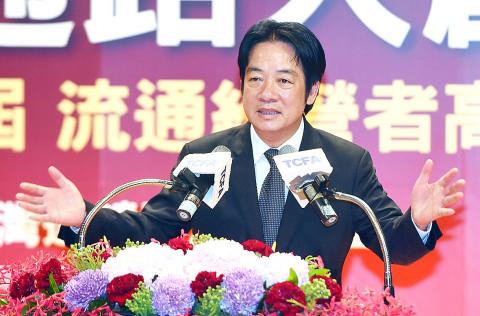Premier William Lai (賴清德) has directed the Ministry of Education to look at ways to ease regulations that ban English-language education at preschools in an effort to start the process of transforming Taiwan into a nation that speaks Chinese and English.
Lai issued the instruction at a meeting last week with officials from the ministry and the National Development Council (NDC), Cabinet spokeswoman Kolas Yotaka said on Thursday in response to media queries about the premier’s plan to make Taiwan a bilingual country, with Chinese and English as official languages.
Kolas said that during the meeting, which discussed how to best ensure the development of bilingual education, it was suggested that the earlier children start learning a language, the quicker they begin to use it.

Photo: Liao Chen-huei, Taipei Times
Lai later instructed the ministry to look at ways to relax regulations that prohibit English-language education at preschools, she said.
Currently, no teaching of foreign languages is allowed at preschools, while the Employment Service Act (就業服務法) stipulates that foreigners can only teach at universities, colleges, high schools or cram schools, with few exceptions allowed.
Given the important role played by language in promoting national development, the premier also instructed the council to lead the way in drafting policies to turn Taiwan into a bilingual nation, Kolas said.
Meanwhile, NDC Minister Chen Mei-ling (陳美伶) said that a a “bilingual country” is defined as one in which most people can read, write, speak and understand two languages.
With that goal in mind, Lai defined the promotion of a bilingual nation as a short-term goal, while pushing for the long-term goal of embracing English as a second official language, Chen said.
She said the council would propose administrative plans or programs for the policy by the end of the year.

AGING: As of last month, people aged 65 or older accounted for 20.06 percent of the total population and the number of couples who got married fell by 18,685 from 2024 Taiwan has surpassed South Korea as the country least willing to have children, with an annual crude birthrate of 4.62 per 1,000 people, Ministry of the Interior data showed yesterday. The nation was previously ranked the second-lowest country in terms of total fertility rate, or the average number of children a woman has in her lifetime. However, South Korea’s fertility rate began to recover from 2023, with total fertility rate rising from 0.72 and estimated to reach 0.82 to 0.85 by last year, and the crude birthrate projected at 6.7 per 1,000 people. Japan’s crude birthrate was projected to fall below six,

Conflict with Taiwan could leave China with “massive economic disruption, catastrophic military losses, significant social unrest, and devastating sanctions,” a US think tank said in a report released on Monday. The German Marshall Fund released a report titled If China Attacks Taiwan: The Consequences for China of “Minor Conflict” and “Major War” Scenarios. The report details the “massive” economic, military, social and international costs to China in the event of a minor conflict or major war with Taiwan, estimating that the Chinese People’s Liberation Army (PLA) could sustain losses of more than half of its active-duty ground forces, including 100,000 troops. Understanding Chinese

US President Donald Trump in an interview with the New York Times published on Thursday said that “it’s up to” Chinese President Xi Jinping (習近平) what China does on Taiwan, but that he would be “very unhappy” with a change in the “status quo.” “He [Xi] considers it to be a part of China, and that’s up to him what he’s going to be doing, but I’ve expressed to him that I would be very unhappy if he did that, and I don’t think he’ll do that. I hope he doesn’t do that,” Trump said. Trump made the comments in the context

SELF-DEFENSE: Tokyo has accelerated its spending goal and its defense minister said the nation needs to discuss whether it should develop nuclear-powered submarines China is ramping up objections to what it sees as Japan’s desire to acquire nuclear weapons, despite Tokyo’s longstanding renunciation of such arms, deepening another fissure in the two neighbors’ increasingly tense ties. In what appears to be a concerted effort, China’s foreign and defense ministries issued statements on Thursday condemning alleged remilitarism efforts by Tokyo. The remarks came as two of the country’s top think tanks jointly issued a 29-page report framing actions by “right-wing forces” in Japan as posing a “serious threat” to world peace. While that report did not define “right-wing forces,” the Chinese Ministry of Foreign Affairs was